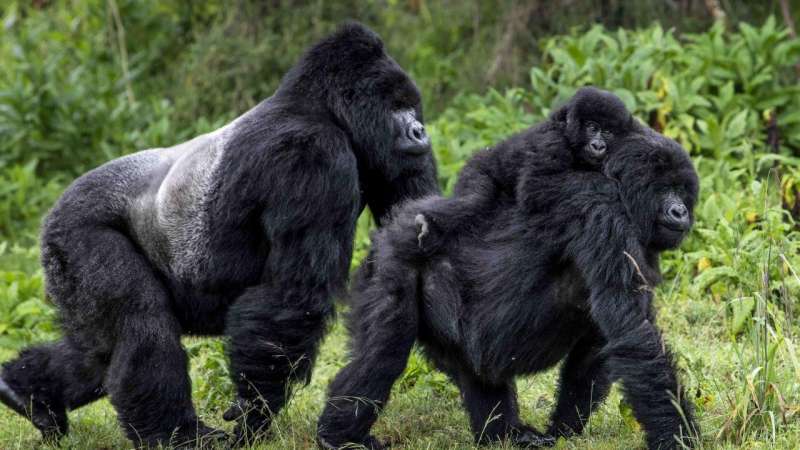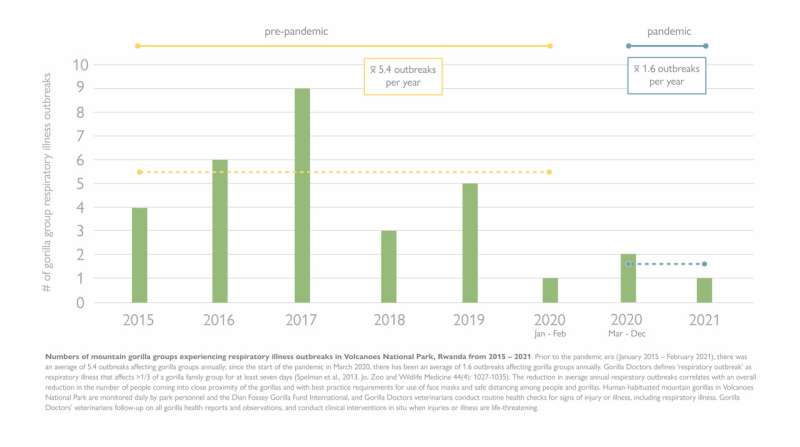A possible COVID-19 silver lining for great ape conservation

Respiratory illness outbreaks among wild mountain gorillas in Volcanoes National Park have declined since the start of COVID-19, according to a Correspondence report in the journal Nature from Gorilla Doctors and the Rwanda Development Board.
Mountain gorillas are susceptible to human-transmitted respiratory pathogens. Respiratory illness is the second leading cause of death in wild, human-habituated populations.
In the five years prior to March 2020, the Volcanoes National Park population averaged 5.4 respiratory illness outbreaks in gorilla family groups annually. In contrast, from March 2020 through December 2021, the population averaged 1.6 respiratory illness outbreaks in the family groups each year. To date, SARS-CoV-2 has not been detected in samples collected from mountain gorillas with respiratory illness.
The decline in respiratory illness outbreaks in mountain gorillas during the COVID-19 pandemic correlates with an overall reduction in the number of people coming into close proximity of the gorillas, and with additional health protection measures taken to reduce the risk of disease transmission from humans to gorillas.
"Respiratory illness outbreaks are common in wild, human-habituated mountain gorillas, and considering that gorillas are susceptible to SARS-CoV-2, this preliminary analysis is such a welcome finding," said co-author Kirsten Gilardi, executive director and chief veterinary officer for Gorilla Doctors, and the director of the Karen C. Drayer Wildlife Health Center at the UC Davis School of Veterinary Medicine. "It is a testament to the early and decisive action of park authorities to help protect mountain gorillas and humans."
The additional safety measures are in accordance with the IUCN Best Practice Guidelines for Health Monitoring and Disease Control in Great Apes, which state: "… disease prevention should be regarded as a top priority … programs should be centered on monitoring health parameters, and modifying human activities accordingly, in order to reduce the risk of disease transmission to great apes."
Gorilla ecotourism was temporarily suspended at the start of the COVID-19 pandemic. The Rwanda Development Board mandated mask-wearing at all times when in close proximity of gorillas and increased the minimum distance to 10 meters, or nearly 33 feet.
Jean Bosco Noheri, a Gorilla Doctors field veterinarian who compiled the data for this comparison cites other potential correlating factors to consider as additional lines of inquiry.
"Variation in pathogenicity of viruses, gorilla group dynamics, climate conditions and a variety of other factors may also be impacting the decrease in respiratory illness outbreaks we have seen," Noheri said.

These findings illustrate the imperative for best practice measures that minimize human disease transmission to great apes. Particularly in light of the omicron variant surge and the return of gorilla tourism, Gorilla Doctors and the Rwanda Development Board recommend these measures be made permanent.
More information: Kirsten Gilardi et al, Keep mountain gorillas free from pandemic virus, Nature (2022). DOI: 10.1038/d41586-022-00331-z
Journal information: Nature
Provided by UC Davis





















